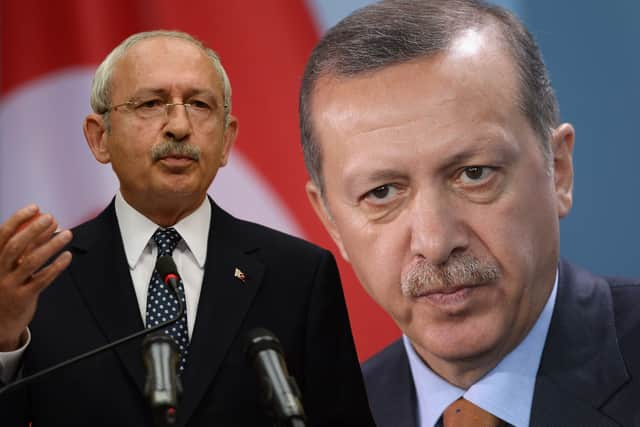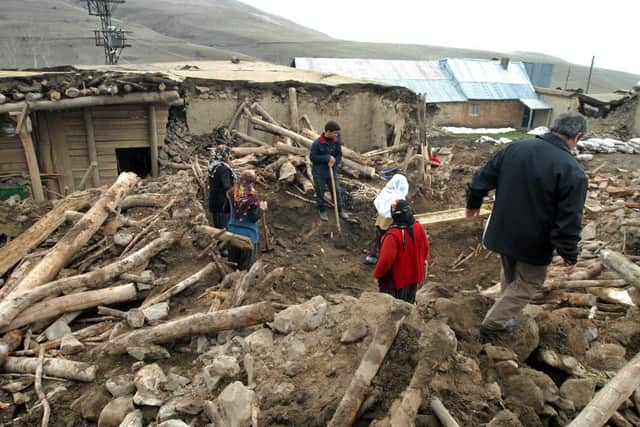Turkish elections: expert on Erdoğan's 'surprising' first round results and what a win would mean for Turkey
and live on Freeview channel 276
Turkey lies on the brink of political upheaval as President Recep Tayyip Erdoğan prepares for battle with the leader of the opposition Kemal Kılıçdaroğlu in the upcoming presidential run-off vote.
The election, which is due to take place 28 May, will see the two go head-to-head at the polls once again after neither candidate managed to reach the 50% threshold for the vote. Taking place in a backdrop of a flailing economy, and a substantial rebuild after devastating earthquakes which blighted southern and central parts of the country earlier this year, Erdoğan - who has been in power for two decades - faced a fierce battle to keep voters on side.
Advertisement
Hide AdAdvertisement
Hide AdKılıçdaroğlu is hoping that he will still be able to capitalise on the anger left over from this. But the first round of voting dropped some surprises for Turkey.
Professor Howard Eissenstat, Turkey expert at St. Lawrence University and non-resident scholar at the Middle East Institute, spoke to NationalWorld about the results so far, why they have come as a surprise to political analysts, and the impact the upcoming run-off results could have for Turkey and the wider world.
Why is the 2023 Turkish election so significant?
Much has been said about the Turkish presidential elections and the precarious position Erdoğan finds himself in. He progressed to the run-off vote with the majority of the vote at 49.51%, but faces a tense battle with opposition leader Kemal Kılıçdaroğlu, who gained 44.88% of the vote in the first round.
Eissenstat said: “It seems like the last best opportunity for Turkey to reverse Erdoğan's authoritarianism, to reclaim Turkey as a contested electoral system and to bring up the control of the AKP [Erdoğan’s ruling party] over the bureaucracy of the media. For the Turkish opposition, this was seen as the last best chance to step away from the brink.”
Advertisement
Hide AdAdvertisement
Hide AdWhile there is a lot on the line in the election for Turkey’s opposition party, there could also be far-reaching consequences around the world.
“A Turkey governed by President Erdoğan, I think is in many ways, is much more challenging for Turkey's European partners than a Turkey governed by Kamal Kılıçdaroğlu," Eissenstat said.
“We have seen over the last 15 to 20 years, this rise of populist, authoritarian governments - Turkey is certainly one, Hungary and Russia being others. So the question has been the trend towards these populist authoritarian governments. Can they actually be pushed back because of Turkey's weak economy right now, because of the devastating earthquake?”


What are the main issues for Turkish voters?
Turkey’s economy is certainly doing badly at the moment. The inflation rate is currently above 45%, with a current account deficit of 4.4% of the country’s GDP. However, this stark economic situation doesn’t seem to have affected voters in the polls.
Advertisement
Hide AdAdvertisement
Hide Ad“They claim that what they're voting about is economic issues. That's what the polling all indicates, and certainly the Turkish economy is in dire straits, and that is largely because of President Erdoğan,” said Prof Eissenstat.
“The electoral results from the first round of the election don't really indicate that the economy necessarily swayed huge numbers of voters. It seems to move numbers around in the single digit percentage points.
“It seems that political identification, anti-migrant politics, the issue of national security and the Kurds, those traditional political identifiers proved more important.”
Likewise, much media attention focused on Erdoğan’s effect on the country’s readiness and response to the earthquakes ,which devastated parts of southern and central Turkey in February. Poorly implemented building standards as well as the aftermath of the wreckage was a sore point for Erdoğan, but voters don’t seem to have been swayed much by this point.
Advertisement
Hide AdAdvertisement
Hide Ad”President Erdoğan was effective in promising that the country would rebuild. A lot of people were willing to accept his shifting and blame or to sort of treat the earthquake as simply a natural disaster and not not a question of mismanagement and bad construction.”


What has led to the ‘surprise’ result?
The result of the first round of voting was surprising in more ways than one. While a battle two decades into his grip on power over Turkey was a surprise for some, political analysts predicted a reduced turnout for Erdoğan due to the issues affecting the economy, and the devastation left by the huge earthquakes earlier this year.
“I was surprised. I think the opposition was surprised. I think that President Erdoğan was perhaps pleasantly surprised," Eissenstat said.
“The country is pretty divided and the sense was because of that division that the opposition would do strikingly better and did somewhat better than it has in the past. I think that everybody was surprised by the fact that, given the economic straits that Turkey is in, that Erdoğan did as well as he did.
Advertisement
Hide AdAdvertisement
Hide Ad“While it's true that he didn't get over the 50% marker in the first round, he came very close 49.5 And you know, that's, that's quite an impressive achievement when you have real inflation at about 100% a year.”
Erdoğan and his government’s tight grip on the media in Turkey, which has continued to increase in recent years, may hold the answer to his surprisingly high voter turnout. Around 90% of Turkish media organisations are owned by either the government directly or businesses with close ties to the government.
“For those people who aren't on social media, the news that they're getting is highly filtered and highly favourable towards President Erdoğan. This is one of the reasons why election observers have described this as a contested election but not fairly contested one.”
Could Erdoğan be defeated in the run-off vote?
There was much excitement among Turkey’s opposition party and voters hoping for change when Kılıçdaroğlu put up a fierce fight against Erdoğan in the first round of voting, falling less than 5% short of matching his vote. But the excitement may be short lived, explains Eissenstat.
Advertisement
Hide AdAdvertisement
Hide Ad“There's still an election and it's still possible, but you don't bet against the house in Vegas. In an electoral authoritarian regime where the government controls the media, controls the institutions and state and can control the information that's getting out, I think it's a real uphill battle.
“It was an uphill battle in the first round, and I think it's a steeper, uphill battle for the opposition in the second round.”
Comment Guidelines
National World encourages reader discussion on our stories. User feedback, insights and back-and-forth exchanges add a rich layer of context to reporting. Please review our Community Guidelines before commenting.
